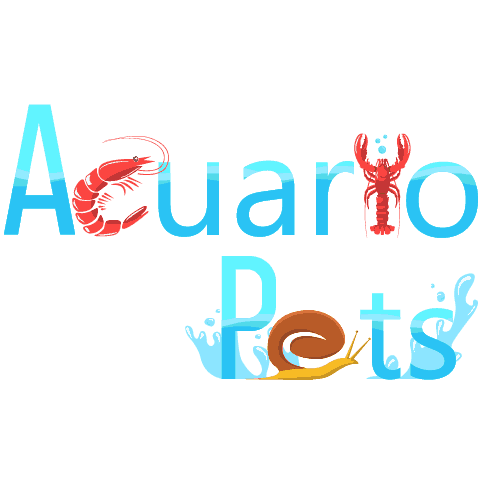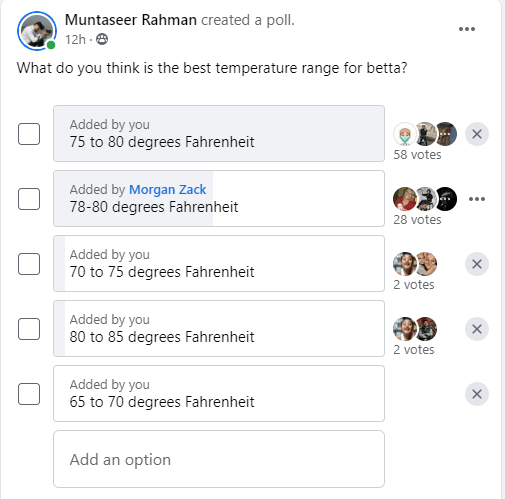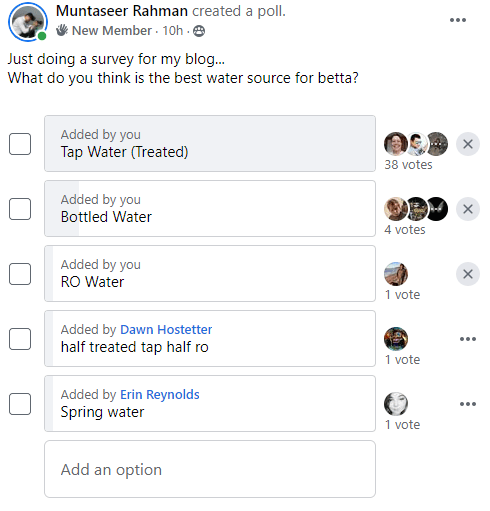This post was created with help from AI tools and carefully reviewed by a human (Muntaseer Rahman) . For more on how we use AI on this site, check out our Editorial Policy.
Check Out These FREE Tools We Made JUST For You!
Ideal Water Parameters For Betta: Betta Fish Water Guide
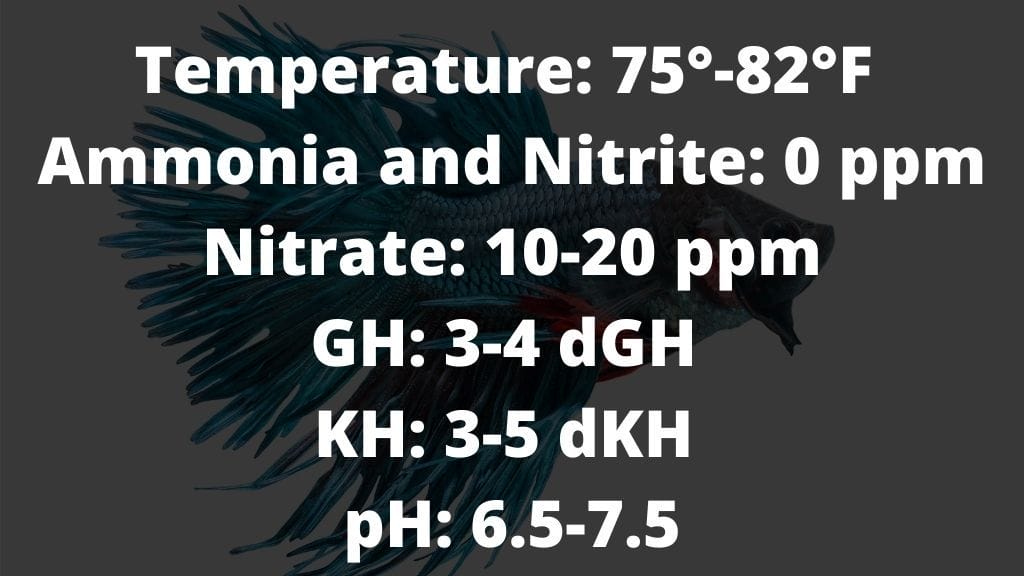
Whenever you want to keep any aquarium pet, the first thing you need to check is its ideal water parameters. Same goes for the betta fish. Like any other aquatic creature, betta fish requires its ideal water parameters to thrive. Now the question is, what are the ideal water parameters for betta fish?
Here is a short list of the ideal water parameters for betta fish:
- Temperature: 75°-82°F (23.8°-27.7°C)
- Ammonia and Nitrite: 0 ppm
- Nitrate: 10-20 ppm
- GH: 3-4 dGH (50-66.7 ppm)
- KH: 3-5 dKH (53.6- 89.4 ppm)
- pH: 6.5-7.5
For keeping betta successfully, you’ll need to know details about these water parameters, why they are important and what happens if they are not in the ideal range. I’ll discuss everything in today’s article.
Ideal Water Parameters For Betta Fish: Table Summary
| Water Parameters | Ideal Range |
|---|---|
| Temperature | 75°-82°F (23.8°-27.7°C) |
| pH | 6.5 – 7.5 |
| GH | 3-4 dGH (50-66.7 ppm) |
| KH | 3-5 dKH (53.6- 89.4 ppm) |
| Nitrate | 10-20 ppm |
Ideal Temperature For Betta Fish
Betta fish have originally come from Thailand, a tropical area. So, the temperature of the water should be similar to that area. Though bettas are hardy and they can live in a wide temperature range, it is recommended to keep the temperature in its ideal range.
The ideal temperature for betta is 75°-82°F (23.8°-27.7°C)
When it comes to temperature, consistency is more important than striking the ideal range. Of course, it is recommended to keep the temperature between 75 to 82 degrees fahrenheit.
However, if the temperature is 75 degrees today and 82 degrees the next day, then it can create serious health issues to the betta. Our goal should a consistent temperature that is preferably in betta’s ideal temperature range.
I did a poll on a popular betta Facebook group to see what temperature range for betta is the most popular.
Here you can see the result yourself:
As you can see, the most popular temperature range for betta is between 75 to 80 degrees Fahrenheit.
Want to get a printable version of this infographic? Click here! [If you want to use this infographic on your website, please link back to this post as the source!]
Ideal pH, GH, & KH For Betta Fish
Ideal pH For Betta
pH refers to how acidic or alkaline the water is. It is measure on a scale of 0 to 14. 7 is the neutral value.
For betta, the ideal pH range is 6.5 to 7.5.
It is better to keep the pH below 7.0 because alkaline water increases the chances of inflammation due to ammonia.
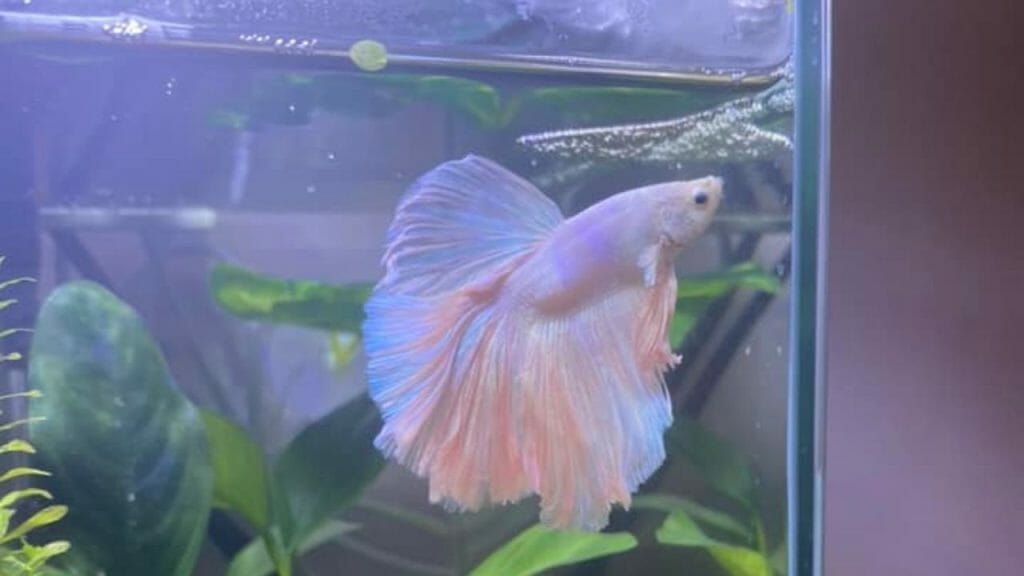
How To Adjust pH Value?
If the pH value is not within the ideal range, you may need to adjust it. Fortunately, adjusting the pH value, i.e. lowering or increasing its value is not that difficult.
There are both commercial and natural products for adjusting pH in an aquarium. I prefer to use the natural product first, i.e. Indian Almond Leaves.
Indian Almond Leaves have tannins. Tannin is highly effective to lower the pH value. You can use one leaf in per square feet area. One leaf is enough for 1 month.
As the leaf deteriorate with time, it will release tannin, and the tannin will keep the pH down.
If you want a quicker result, you can go for either API pH UP or API pH Down. Both are very reliable and deliver result much quicker.
Ideal GH For Betta
GH stands for General Hardness. GH calculates how much molecules are present in the water (except for the water molecules). That means, GH will shed a light on how much magnesium, calcium, minerals and other ions the water contains.
The ideal GH range for betta is 3-4 dGH (50-66.7 ppm)
Too much GH means the water is hard. On the other hand, little GH indicates a soft water.
Need To Talk With A Vet Right Now?
How To Adjust GH?
There is not many effective natural ways to adjust the GH. However, there are a couple of commercial products that are perfect for lowering or increasing the GH value.
If you need to lower down the GH value, use API Water Softener. On the contrary, for increasing the GH, use Seachem Equilibrium.
If the GH value is too much off the ideal range, try to find out what is causing this large offset. Try to find the reason and eliminate it from the root. Otherwise, just using products won’t do you any good in the long run.
Ideal KH For Betta
KH stands for Carbonate Hardness. It determines how stable the pH is.
Higher KH means very stable pH and vice versa.
The ideal KH range for betta is 3-5 dKH (53.6- 89.4 ppm)
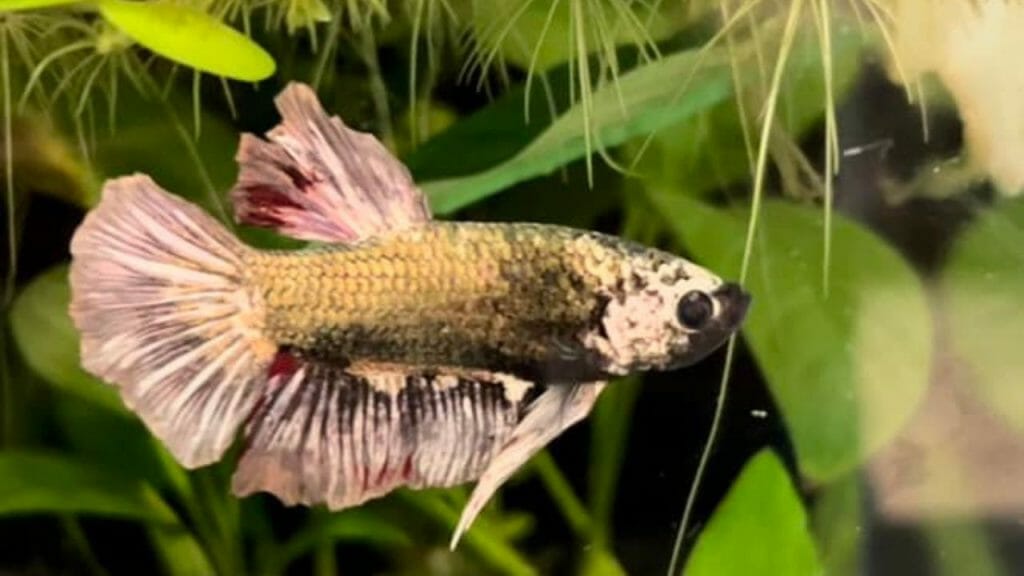
Alongside maintaining the crucial temperature and pH levels as highlighted, Mary McCauley, a betta fish rescue center owner, adds that an ideal betta tank includes a 5-gallon minimum tank, gentle filter, heater, and specific decor for enrichment and safety.
Other Water Parameters To Check Regularly
Salinity
Betta is a freshwater fish. That means, they can’t live in saltwater. So, you’ll obviously need to use freshwater in a betta tank.
However, for preventing or curing any disease like ich, you can use prescribed dose of aquarium salt in the betta tank (preferably in a separate hospital tank to treat the betta).
Tannins
Tannin is a type of chemical that makes the aquarium water soft. If you have very hard water, i.e. high GH, then it is recommended to place something in the tank that releases tannin.
Other than making the water soft, tannin is also very important for keeping a betta tank healthier. Betta loves a softer water environment. Tannin is great for that.
There are many natural sources for tannin. Some popular ones among hobbyists are Indian Almond Leaves, driftwood, almond bark, etc.
Ammonia For Betta
Ammonia is extremely toxic for any tropical fish. The amount of ammonia in a betta tank should be 0, not even 1 ppm. Even a slight amount of ammonia can distress the betta and burn its gills. So, there should be no signs of ammonia.
How Ammonia Comes Into The Tank?
Whenever organic matters break down in the aquarium, they produce ammonia. These organic matters include uneaten fish food, dead organic matters, fish poop, etc. All these deteriorate and produce ammonia.
Now, you might’ve heard about Nitrogen Cycle. When a tank is properly cycled, a colony of beneficial bacteria forms inside the filter media. These bacterial colony takes care of the ammonia and turn it into nitrite.
As a result, in a well balanced tank, you won’t see any sign of ammonia.
How To Deal With Excess Ammonia?
If you see any sign of ammonia or distress due to ammonia, immediately do a 50% water change. Try to find out what is causing the ammonia spike and deal with that immediately.
Remember, ammonia can be deadly for betta fish. So, deal with it carefully and right away.
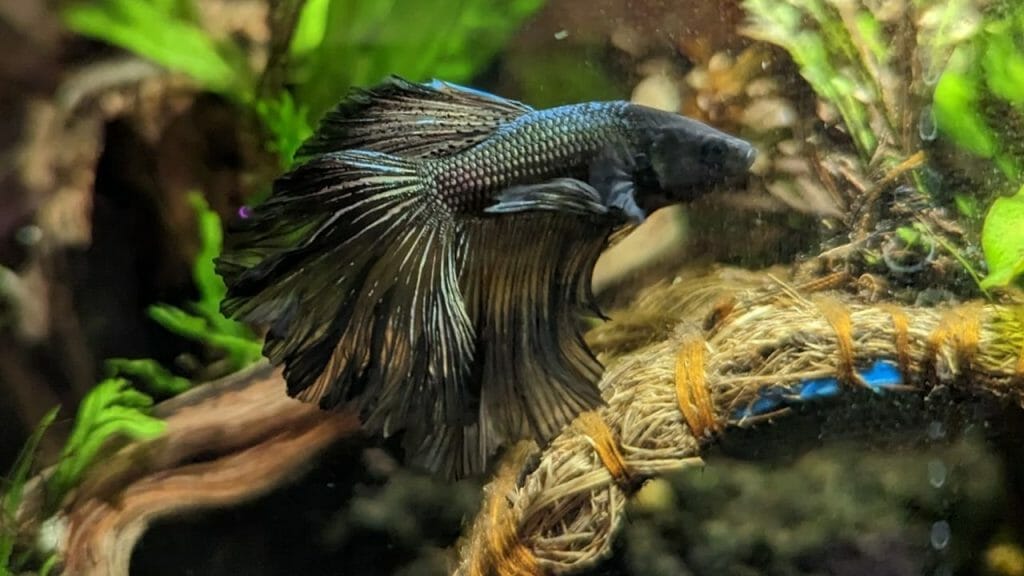
Nitrite For Betta
Like ammonia, nitrite is also very toxic to fish. So, the amount of nitrite in a fish tank should also be 0.
Fortunately, if your tank is properly cycled, you won’t need to be tensed. The beneficial bacterial colony will eat the nitrite and turn it into nitrate, a much safer (still harmful) chemical for the fish.
Nitrate For Betta
Nitrate is the end product of the Nitrogen Cycle. When the beneficial bacteria starts dealing with ammonia, the below chain reaction occurs:
Ammonia -> Nitrite -> Nitrate
Unlike the predecessors, Nitrate is not too harmful. However, if too much nitrate builds up, it can still create a toxic environment for the betta fish. That’s why we recommend to perform weekly water changes in order to deal with excess Nitrate.
The safe level of nitrate in a betta tank is 10 to 20 ppm.
Water Test Kit For Betta Fish
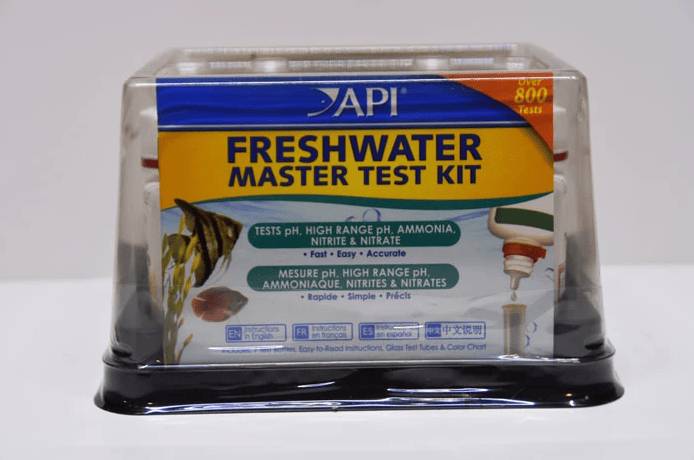
The good thing is, with just one kit, you can check all the water parameters. If you are serious about betta keeping, I’ll highly suggest investing on this water test it. It will increases your success rate in betta keeping by many folds.
I am talking about the API Master Test Kit. With this single kit, you can measure the following water parameters:
- Ammonia
- Nitrite
- Nitrate
- pH
- High Range pH
You’ll get the following items with the kit:
- 7 bottles of testing solution
- 4 glass tubes with cap
- 1 color card
I can’t stress enough how important it is to check these water parameters. So, if you have the budget, definitely get this API Master Test Kit.
Best Water Conditioners For Betta Fish
Water conditioners treat water from any kind of impurities and make it safe for the fish. There are specific water conditioners for betta.
If you live in an area where the water is too hard or contains chlorine/chloramine, then you’ll definitely need to treat the water with a water conditioner.
I’ll recommend two water conditioners. Both are excellent at keeping the water safe and healthier for betta.
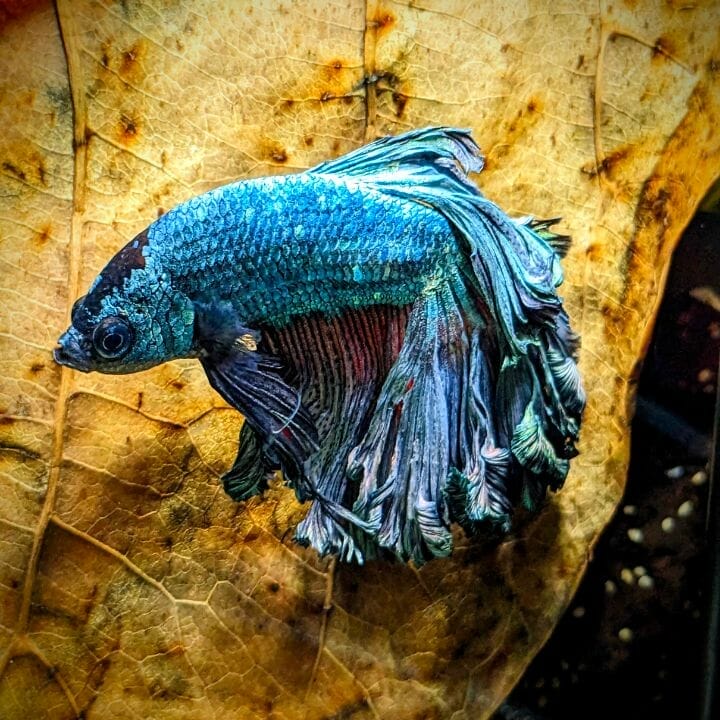
Indian Almond Leaves
Indian almond leaves are perfect for betta tank. They are natural, very cheap and add an aesthetic view to the tank. Not only for visual purpose, Indian Almond leaves are also very effective at keeping the water soft.
These leaves release a chemical called tannin. Tannin is a brownish chemical which makes the water softer and healthier for tropical fish. Bettas love Indian almond leaves in their tank.
The only downside to Indian Almond leaves is, too much leave can turn the aquarium water brown which may not be visually pleasing.
A good rule of thumb is, use 1 leaf for 1 square feet space for 1 month.
If you don’t have any Indian Almond leaves available in your area, get this deal right away in Amazon. You’ll get around 10 large leaves in a single pack shipped directly to your home.
Aqueon Betta Bowl Plus
If you want something that treats the water instantly, then Aqueon Betta Bowl Plus will be a good choice. Why?
- Makes the water safe and neutralizes the harmful chemicals instantly
- Developed specifically for bettas
- Rich in truce elements that promote color, health and natural slime coat protection in betta
For a good deal, check this on Amazon.
What Kind Of Water Is Best For Betta Fish?
There are many types on opinions on the best water source for a betta tank. Personally, I don’t think there is one single best source. However, one type of water can certainly have advantages over the other.
I did a poll on a popular betta Facebook group to see what water source for betta is the most popular.
Here’s the result:
As you can see, the most popular water source for betta is treated tap water.
Now, I’ll talk about 3 most common water sources for betta:
Tap Water
The good thing about tap water is, it is free. You’ll always have access to it.
However, tap water can contain seriously harmful chemicals for a betta. In most cities and municipals, the water supply center use chlorine and chloramine in the water. These keep the water safe for human consumption.
However, both of these chemicals are detrimental to any tropical fish. So, if your tap water contains chlorine or chloramine, you’ll need to treat it right away before using in the tank.
Along with chlorine and chloramine, some other harmful elements can also be present in your local tap water including industrial pollutants as well as chemotherapy agents.
So, with tap water, you can never be 100% sure that it is safe for the betta.
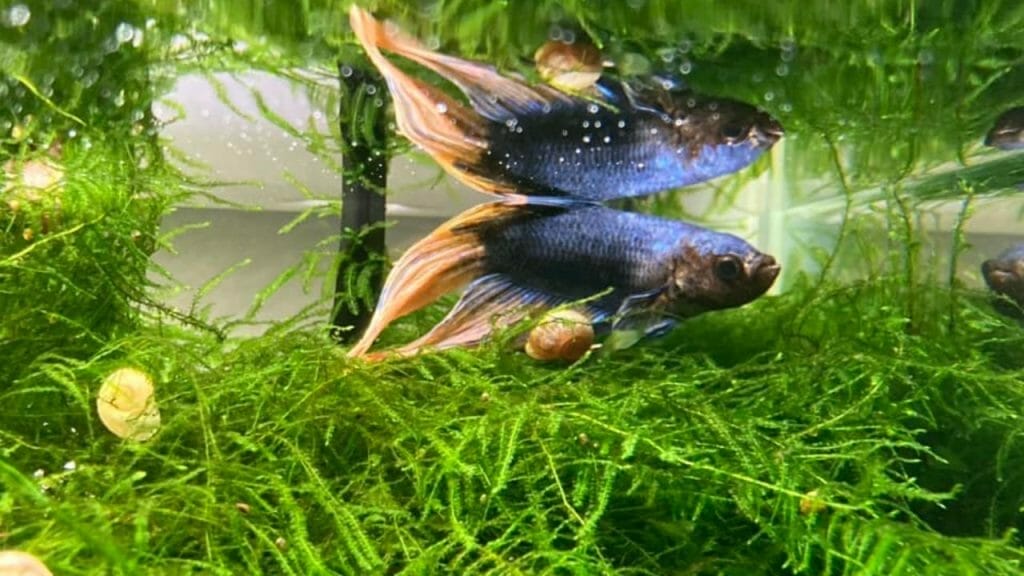
RO Water
The good thing about RO water is, it is 100% safe for any living being. There is nothing mixed in RO water except for the water itself.
However, RO waters are not commonly available and can be very expensive depending on where you live. Another problem with RO water is, as there is nothing mixed with it, you’ll need to mix some helpful salts with the water before adding it to the tank.
Betta needs a specific level of GH and KH. Without mixing the salts, you’ll never get the RO water suitable for the betta’s optimum care.
Bottled Water
Bottled water can be a temporary source of water for your betta tank if the water from tap source is too hard. However, using bottled water to fill a betta tank is not economically feasible. Bottled water can also contain some chemicals which can be harmful for tropical fish.
If you ask my recommendation, I’ll ask you to use tap water with proper water conditioner to ensure it is safe for the betta.
How To Change Betta Fish Water?
It is always recommended to change 15% to 20% of the water of any type of aquarium at least once a week. Why?
We’ve talked about it earlier in this post. Remember the nitrogen cycle? For your reference, I am mentioning the quick cycle here again:
Ammonia -> Nitrite -> Nitrate
In this cycle, you can see that the last product is Nitrate. As nitrate builds up in the aquarium, it can create a toxic environment for the fish. So, in order to keep the level of Nitrate in check, we’ll need to perform weekly water changes.
Water change is one of the most crucial keys to keeping a successful and healthy betta tank. So, you can’t be a lazy bump about it.
This video will show you exactly how I change water in a tank:
Here is full process step by step:
- First, turn off all the electric component in the tank. Take out the filter and lights.
- Take a Siphon pump to drain out the tank water. While siphoning, remember to suck dirt from the substrate and all the corners.
- If your tank has algae, scrub it off before draining the water.
- Once the water is drained, fill with with new water.
- Before filling with new water, make sure the water is safe and treated for betta. Use a good quality water conditioner to be 100% safe.
- Do a quick test and check if all the water parameters are in the right range or not
What Water Hardness Do Bettas Like?
Like all tropical fish, bettas thrive in soft water. But, these fish can tolerate moderately hard water in the aquarium. If you keep your betta in hard water, high mineral levels can affect the internal organs of your betta.
The water hardness should be less than 25 DH for your betta. To help your betta thrive well, you should keep the water hardness between 70-300 ppm or 6-12 GH. The best GH for your betta will be 3-4 dGH.
If the water hardness crosses the ideal range, you can apply a few methods to soften the water. By adding water conditioners and water-softening pillows, the mineral contents can get absorbed.
Besides, you can add peat moss filters. These filters will soften the hard water by removing the magnesium and calcium ions from the water. Another suitable method is the reverse osmosis process to remove the hardness of your betta fish.
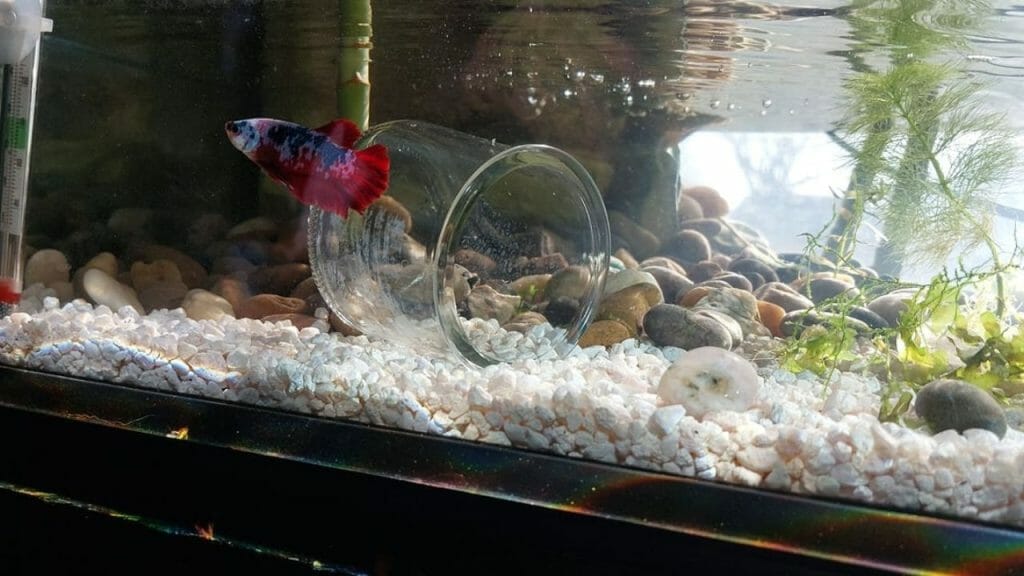
How To Test Betta Fish Water?
Since there are added biological wastes of your betta, decaying plants, leftovers, and other rotten materials, the water parameters do not remain constant. Hence, you must check the water parameters to keep the ideal pH, GH, and KH for your betta.
To test your betta fish water, you can take the help of aquarium test kits. It’s an affordable method to measure the water quality in your betta tank.
Firstly, you should take some water samples from your betta tank in a test container. Then, you should dip the test kit in the water and make a few swirls. After removing the strip, you should wait for a while to notice the color changes in the strip.
Although these test strips can not give you as accurate results as other methods, you can determine the concerning ranges. The last step to do is to match the color change of the strip with the given color chart.
However, there are several types of test kits for betta fish water. Instead of the stripe method, you can try liquid test kits, scientific meters, probes, etc. There are also separate test kits to measure the level of ammonia, pH, nitrite, nitrate, oxygen, etc.
If you look for any recommendations, I’ll suggest you API Freshwater Master Test Kit for your betta fish water.
What Should GH And KH Be For A Betta?
To keep the biological functions of your betta alright, you must maintain an ideal GH level. You should keep the GH level within 3-4 dGH (50-66.7 ppm) in your betta tank to keep the water soft.
Since KH controls the buffering capacity of your betta tank, it affects the water pH level. The ideal KH level for betta should be 3-5 DKH (53.6-89.4 ppm).
What Alkalinity Do Bettas Like?
If you look at the wild habitat of your betta closely, you’ll find lower pH in the water. In the wild, betta lives in slightly acidic water.
Bettas do not like high alkalinity. These betta fish can not survive in alkaline water. You should try to keep the water slightly acidic to neutral for your betta fish.
Low carbon dioxide levels, decaying organic matter, and the presence of coral sand and limestone rock can increase the alkalinity of the water of your betta tank. The digestive system of your betta is highly dependent upon the pH level of the water. Moreover, your betta fish will show unusual behavior and signs of illness due to the high alkalinity in the tank water.
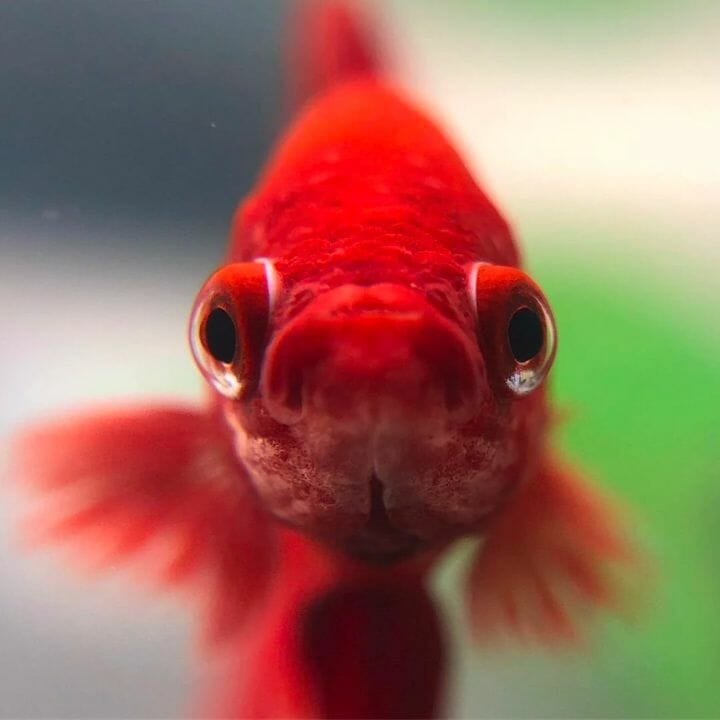
How do you test the quality of a betta fish water?
To test the quality of a betta fish’s water, you should regularly test for ammonia, nitrites, and nitrates. You can also test the water’s pH level using a pH test kit. Using an aquarium test kit is another option, which involves adding reactive chemicals to the water and comparing the results to a chart. I recommend API Master Test Kit.
What is the best water depth for betta?
The best water depth for betta fish is between 8 to 12 inches. It’s better to have a broad and shallow tank than a narrow and tall one to provide more swimming space for your betta fish.
Do betta fish prefer long or tall tanks?
Betta fish prefer long tanks rather than tall tanks. Bettas are naturally found in shallow waters such as rice paddies and small streams, and are adapted to swimming horizontally rather than vertically.
Do betta fish like fast water?
Betta fish do not like fast water flow as they are adapted to still water in their natural habitat. Fast water flow can stress them out and make it difficult for them to swim.
Final Words
So, this is all I had to share about betta fish water guide. I hope you’ve learnt a lot of things throughout the post that will definitely make you a better betta keeper in the future!
About Author
Hello, I’m Muntaseer Rahman, the owner of AcuarioPets.com. I’m passionate about aquarium pets like shrimps, snails, crabs, and crayfish. I’ve created this website to share my expertise and help you provide better care for these amazing pets.
Disclaimer
This site is owned and operated by Muntaseer Rahman. AcuarioPets.com is a participant in the Amazon Services LLC Associates Program, an affiliate advertising program designed to provide a means for sites to earn advertising fees by advertising and linking to Amazon.com. This site also participates in other affiliate programs and is compensated for referring traffic and business to these companies.
